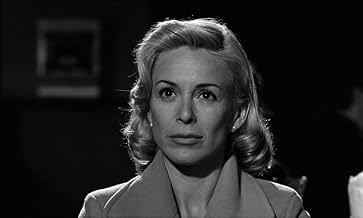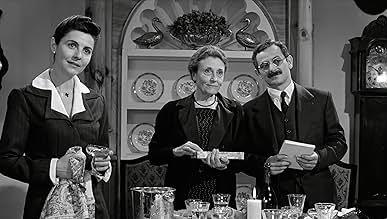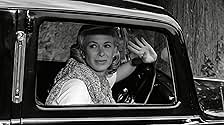Aggiungi una trama nella tua linguaSpain, late 1940s. Julia leaves Madrid after falling into a deep depression when his lover, José Miguel, a prominent painter and opponent of the Fascist regime, is incarcerated.Spain, late 1940s. Julia leaves Madrid after falling into a deep depression when his lover, José Miguel, a prominent painter and opponent of the Fascist regime, is incarcerated.Spain, late 1940s. Julia leaves Madrid after falling into a deep depression when his lover, José Miguel, a prominent painter and opponent of the Fascist regime, is incarcerated.
- Premi
- 15 vittorie e 22 candidature totali
Trama
Lo sapevi?
- Citazioni
Don Matias: My God, why haven't you forsaken me?
- ConnessioniFeatures Gunga Din (1939)
Recensione in evidenza
Splendid and gorgeous film from the Academy Award winning director of ¨Volver a Empezar¨ . Enjoyable drama with mood pieces about Spain of the 40s ; including enjoyable performances , adequate set design and delightfully shot . Deeply depressed Julia (Lydia Bosch) leaves Madrid to return to the village of her youth , there she meets old friends (Ana Fernandez , Julia Gutierrez Caba) , friendship (to a boy , Manuel Lozano) and love (to a Elementary teacher , Iñaqui Miramon). She seems to have reached the end of his life and of his art in writing , but then Julia leaves an indelible mark on all , while she changes for the better. In village her life is simplistic and gentle , experiencing great impact all around . The villagers inspire her and give life .
This is a thought-provoking drama filmed with great sensitivity and feeling. It's an intelligent and touching story although sometimes is slow moving and tiring but is finely developed with sense of style and sensibility . Very pleasant drama , plenty of sensitivity , emotion , artistic scenes and abundant outdoors filmed on glamorous exteriors perfectly photographed . In the picture are treated ethics and morals themes developed with great sense of fairness and ductility . Interesting screenplay by Jose Luis Garci and Horacio Valcarcel ; Garci often co-writes his scripts with his friend Horacio Valcarcel . This is Garci's return to top form, with a brooding and engaging script which uses entertaining situations to give us a good movie in a high sense and intimate sensitivity and that kept me entertained for the almost two hours of duration . Filmed in his usual formal and luxurious style , without leaving a trace the joyful themes , in terms of dramatic and narrative excitement . It is well set and is as marvelously filmed as it is written and acted . This is one of those rare gems that does not stray from its purpose - to be a celebration of love , nature , and romance and a sensitive tale . Excellent acting by Lydia Bosch as a deranged woman who will have to face the traumatic past and choose between her upsettings old experiences and love . Support cast gives nice interpretations such as Ana Fernandez , Julia Gutierrez Caba , Fernando Guillén , Carlos Hipólito , Marisa de Leza , Jesús Puente , Francisco Algora and Juan Diego as a stiff priest . Awesome cinematography in black and white by Raul Perez Cubero as is reflected on the marvelous outdoors of the countryside and brilliant interiors . Well filmed on marvelous locations as Natutal Park of Muniellos , Llanes, , Church of Valdedios and Santa Cristina Lena (Asturias) . Emotive and sensitive musical score by Pablo Cervantes . Spectacular as well as evocative production design by Julian Mateos ( Tiovivo c. 1950 , You're the one , El Abuelo) , Garci's usual .
The motion picture was compellingly directed by Jose Luis Garci (El Crack I, II, Luz Domingo) who won one Academy Award for ¨Volver a Empezar¨. José Luis Garci is without a doubt one of the most influential film personalities in the history of film in Spain and perhaps the best known writer in the country. He has left a distinguished talent in his successful movies throughout the years: La Cabina (1972), Las Verdes Praderas (1979), El Crack (1981), Volver a Empezar (1982), Canción De Cuna (1994), La Herida Luminosa (1997), El Abuelo (1998), Tiovivo c. 1950 (2004) and Ninette (2005) , among others. Rating : Better than average and well worth seeing . For these reasons is essential and indispensable watching .
This is a thought-provoking drama filmed with great sensitivity and feeling. It's an intelligent and touching story although sometimes is slow moving and tiring but is finely developed with sense of style and sensibility . Very pleasant drama , plenty of sensitivity , emotion , artistic scenes and abundant outdoors filmed on glamorous exteriors perfectly photographed . In the picture are treated ethics and morals themes developed with great sense of fairness and ductility . Interesting screenplay by Jose Luis Garci and Horacio Valcarcel ; Garci often co-writes his scripts with his friend Horacio Valcarcel . This is Garci's return to top form, with a brooding and engaging script which uses entertaining situations to give us a good movie in a high sense and intimate sensitivity and that kept me entertained for the almost two hours of duration . Filmed in his usual formal and luxurious style , without leaving a trace the joyful themes , in terms of dramatic and narrative excitement . It is well set and is as marvelously filmed as it is written and acted . This is one of those rare gems that does not stray from its purpose - to be a celebration of love , nature , and romance and a sensitive tale . Excellent acting by Lydia Bosch as a deranged woman who will have to face the traumatic past and choose between her upsettings old experiences and love . Support cast gives nice interpretations such as Ana Fernandez , Julia Gutierrez Caba , Fernando Guillén , Carlos Hipólito , Marisa de Leza , Jesús Puente , Francisco Algora and Juan Diego as a stiff priest . Awesome cinematography in black and white by Raul Perez Cubero as is reflected on the marvelous outdoors of the countryside and brilliant interiors . Well filmed on marvelous locations as Natutal Park of Muniellos , Llanes, , Church of Valdedios and Santa Cristina Lena (Asturias) . Emotive and sensitive musical score by Pablo Cervantes . Spectacular as well as evocative production design by Julian Mateos ( Tiovivo c. 1950 , You're the one , El Abuelo) , Garci's usual .
The motion picture was compellingly directed by Jose Luis Garci (El Crack I, II, Luz Domingo) who won one Academy Award for ¨Volver a Empezar¨. José Luis Garci is without a doubt one of the most influential film personalities in the history of film in Spain and perhaps the best known writer in the country. He has left a distinguished talent in his successful movies throughout the years: La Cabina (1972), Las Verdes Praderas (1979), El Crack (1981), Volver a Empezar (1982), Canción De Cuna (1994), La Herida Luminosa (1997), El Abuelo (1998), Tiovivo c. 1950 (2004) and Ninette (2005) , among others. Rating : Better than average and well worth seeing . For these reasons is essential and indispensable watching .
I più visti
Accedi per valutare e creare un elenco di titoli salvati per ottenere consigli personalizzati
Dettagli
- Data di uscita
- Paese di origine
- Sito ufficiale
- Lingua
- Celebre anche come
- You're the One
- Luoghi delle riprese
- Aziende produttrici
- Vedi altri crediti dell’azienda su IMDbPro
- Tempo di esecuzione1 ora 51 minuti
- Colore
- Mix di suoni
- Proporzioni
- 2.35 : 1
Contribuisci a questa pagina
Suggerisci una modifica o aggiungi i contenuti mancanti

Divario superiore
By what name was You're the one (una historia de entonces) (2000) officially released in Canada in English?
Rispondi



























